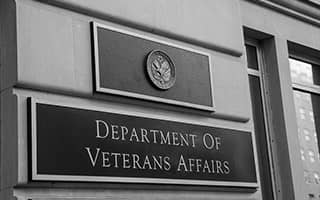Instant Court Case Lookup
The following is for information purposes only
Table of Contents
Veterans Courts

Veterans Treatment Courts (VTCs) were established to divert eligible veterans charged with certain nonviolent offenses into court-supervised, treatment-focused programs. These veterans are usually involved in the criminal justice system due to service-related conditions such as substance abuse, PTSD, and traumatic brain injuries. From their inception in 2008, these courts have sought to blend judicial oversight with veterans' services, peer mentors, and coordinated treatment plans to support recovery and community reintegration.
VTCs operate through a collaborative model involving judges, prosecutors, defense attorneys, VA representatives, and veteran mentors. The VTC model emphasizes rehabilitation over punishment, with participants engaging in individualized treatment, regular court appearances, drug testing, and incentives for progress rather than traditional incarceration.
What Are Veterans Treatment Courts?
Veterans Treatment Courts are specialized court programs designed to handle cases involving military veterans struggling with substance use disorders, mental health issues, or difficulties reintegrating into civilian life. These courts are modeled after drug and mental health courts and were formed in response to the growing number of veterans entering the criminal justice system with conditions tied to their military service. These conditions include substance addiction, PTSD, and mental health conditions.
The mission of VTCs is to divert eligible veterans from traditional prosecution and incarceration into a structured rehabilitation program that addresses the root causes of criminal behavior in participants. Rather than punishing veterans for offenses related to service-connected struggles, VTCs focus on treatment, accountability, and recovery. In doing so, they restore stability, reduce recidivism, and promote long-term wellness.
VTCs operate through a collaborative model that integrates the justice system with healthcare and social services. Judges, prosecutors, defense attorneys, Veteran Affairs (VA) representatives, treatment providers, and veteran mentors work together to create individualized plans supporting veterans' recoveries.
Participants in the VTC undergo frequent drug testing, court reviews, and mandatory counseling. The collaboration between VTCs, the justice system, healthcare, and social services facilitates expedited access to benefits, housing, and employment resources while maintaining legal oversight and structured routes back to civilian life.
Structure and Operation of Veterans Courts
VTCs are staffed by multidisciplinary teams who are considered stakeholders working together on the rehabilitation and reintegration into society of the participants of the courts' program. The composition of VTCs includes the following:
- The Judge: This judge presides over proceedings and monitors participants' progress.
- Prosecutors and Defense Attorneys: These stakeholders work collaboratively, balancing justice with treatment goals.
- Veterans Affairs (VA) Representatives: These representatives connect participants to essential services such as mental health care, substance use treatment, and housing assistance.
- Veteran Mentors: These are typically peers who have served in the military. They provide guidance, support, and accountability throughout the program.
Eligibility Criteria
Eligibility for VTC programs includes nonviolent misdemeanors and select nonviolent felony offenses, with each program defining specific eligible offense categories locally.
Typical requirements include verified veteran status, a clinical diagnosis or demonstrated needs related to substance use or mental health (often PTSD or traumatic brain injury), and voluntary consent to participate under court supervision.
Program Phases
The VTC process begins with screening by court intake staff and clinical assessment to determine eligibility. Afterward, the treatment planning and monitoring team creates individualized care plans, combining therapy, substance use treatment, mental health services, medication management, vocational training, and social support. Progress is tracked by case managers and providers.
VTC program participants attend court appearances for progress reviews where the judge uses incentives, graduated sanctions, and mentorship plans to shape their behavior. Upon meeting all milestones, participants graduate, often with charges dismissed or reduced.
Types of Cases Heard in Veterans Courts

Veterans Treatment Courts primarily handle criminal cases that are closely linked to the psychological, emotional, or physical impacts of military service. While most VTCs limit their jurisdiction to non-violent offenses, some of these courts expand eligibility for select felonies if a direct connection between the offense and the veteran's service-related struggles can be demonstrated.
Typically, the scope of cases heard in these courts covers the following types of offenses:
- Substance abuse and DUI-related offenses: VTCs commonly accept nonviolent drug offenses, possession charges, and DUI cases when substance use disorders are central to the veteran's conduct. Many veterans struggle with addiction or self-medication following combat exposure or trauma, leading to impaired driving or drug possession charges.
- Domestic violence and mental health-related crimes: Some VTCs address lower-level domestic incidents and offenses linked to untreated PTSD, traumatic brain injury, or other behavioral health disorders. VTCs treat these cases with heightened sensitivity, combining therapy, anger management, and relationship counseling.
- Probation violations and low-level felonies tied to service-related trauma: Many VTC programs admit veterans cited for probation violations, theft, trespassing, or nonviolent felonies often resulting from homelessness, unemployment, or untreated mental health issues.
Veterans Court Records and Dockets
Veterans court records typically include case filings, treatment compliance reports, progress reviews from providers and the court, docket entries, and final dispositions. Due to the sensitive nature of these proceedings, typically involving mental health diagnoses, substance use history, and medical records, strict confidentiality standards apply.
Basic docket information, such as case numbers, charges, and hearing dates, is generally publicly accessible. However, treatment-related records and medical evaluation information are generally sealed or restricted under HIPAA and state privacy laws to protect the veterans' personal health information.
How to Access Veterans Court Records
Publicly accessible records can typically be obtained in two ways: online and offline. Many states and counties provide online court portals where users can search by case number, party name, or court type.
However, to access VTC records offline, individuals may submit a request to the clerk of the court that handled the case. Certified copies of VTC records and sealed records of the courts can only be accessed via in-person requests.
In-person requests typically require the submission of valid photo ID and the appropriate copying or certification fee. In cases involving sealed or restricted records, a confidentiality waiver or court order may be required before release.
State-by-State Availability of Veterans Courts
About 48 states in the United States operate veteran treatment courts or equivalent programs. However, about 34 of these states have statutory backing for their VTC programs, while the remaining 14 are not statutorily endorsed at the state level. In the 14 jurisdictions, the VTCs are established by the courts there, operating under local policies and procedures and state court rules.
Examples of states with notable VTC programs include California, Texas, Florida, New York, Illinois, and Ohio. These jurisdictions host several county and municipal VTCs. These programs vary in scale from single-court pilots to statewide networks coordinated by judicial or justice agency offices.
In jurisdictions without established VTCs, pilot projects and strategic planning initiatives are common, often supported by federal grants, state judicial planning bodies, or nonprofit technical assistance to develop local models, train stakeholders, and align VA and community services. Availability of VTCs in such jurisdictions depends on local prosecutorial buy-in, judicial leadership, treatment provider networks, and veteran population density.
Frequently Asked Questions About Veterans Treatment Courts
The following are frequently asked questions about veterans' treatment courts in the United States.
Who qualifies as a "veteran" for eligibility in a Veterans Treatment Court?
Eligibility typically requires prior service in the U.S. Armed Forces. Some courts limit participation to those with honorable or general discharges, while others may accept veterans with other discharge types, depending on circumstances.
Can active-duty service members participate in Veterans Treatment Courts?
Most VTCs are designed for veterans, but some jurisdictions allow active-duty personnel, especially National Guard or Reserve members, if the offense is service-related.
How long does the typical Veterans Treatment Court program last?
Programs generally last 12 to 24 months, depending on the participant's progress and compliance.
What happens if a participant fails to complete the program?
Failure to complete may result in the case returning to traditional criminal court, where sentencing or prosecution resumes.
Are there fees or costs associated with joining a Veterans Treatment Court?
VTC participation is usually free of charge, though some courts may require nominal fees for treatment or supervision services. Many costs are covered by the VA or court grants.
Do Veterans Courts handle felony cases, or only misdemeanors?
Many VTCs accept non-violent misdemeanors and certain low-level felonies, depending on jurisdiction and the nature of the offense.
Can Veterans Courts expunge or dismiss criminal records after graduation?
Yes. Many courts offer record expungement, sealing, or dismissal upon successful completion, depending on local laws.
How are mentors selected, and what training do they receive?
Mentors are typically volunteer veterans who undergo specialized training in communication, confidentiality, and crisis response to support participants throughout the program.
Is participation in Veterans Treatment Court considered an admission of guilt?
Participation may involve entering a guilty plea or deferred judgment, but the structure varies by court. Some use pre-plea diversion models.
Are victims involved or notified in Veterans Court proceedings?
Victims are typically notified and may have input, especially in cases involving harm. Victims' rights are still respected under state law.
Can a veteran's family participate in the rehabilitation process?
Yes. Family members often play a key role and may be involved in therapy, counseling, and support planning, depending on the treatment model.
What percentage of participants successfully graduate from Veterans Treatment Courts?
Graduation rates vary, but studies show that 60-75% of participants complete the program, a success rate higher than many traditional court alternatives.
Do all states offer Veterans Treatment Courts, and how can I find one nearby?
Nearly all U.S. states have at least one VTC. You can check with your local court system, VA Justice Outreach Specialist, or visit the National Treatment Court Resource Center (NTCRC) website to locate one.
Are Veterans Court proceedings open to the public or confidential?
Basic proceedings may be public, but treatment details and case files are confidential, due to mental health and medical privacy laws.
How do Veterans Courts differ from other specialty courts, such as Drug or Mental Health Courts?
While they share rehabilitation goals, VTCs are tailored to veterans' service-related conditions, including veteran peer mentors, and coordinate directly with VA services.
Other Court Types
- Appellate Courts
- Bankruptcy Courts
- Circuit Courts
- Civil Courts
- Criminal Courts
- District Courts
- Drug Courts
- Estate Courts
- Family Courts
- Federal Courts
- Justice Courts
- Juvenile Courts
- Land Courts
- Magistrate Courts
- Municipal Courts
- Parish Courts
- Pretrial Services
- State Courts
- Superior Courts
- Supreme Courts
- Tax Courts
- Traffic Courts
- Tribunal Courts